Culture of Iraq
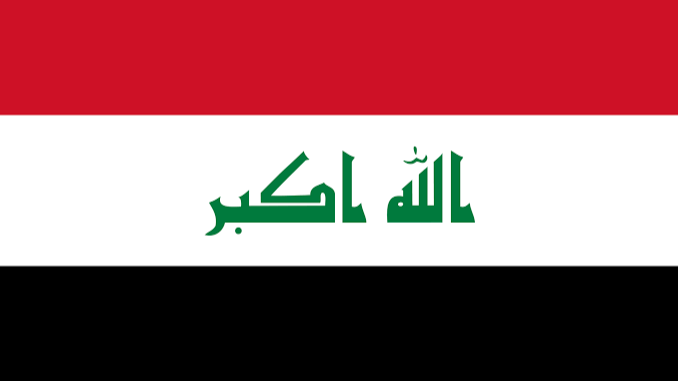
Culture Name
Iraqi
Orientation
Identification. Modern Iraq covers almost the same area as ancient Mesopotamia, which centered on the land between the Tigres and the Euphrates Rivers. Mesopotamia, also referred to as the Fertile Crescent, was an important center of early civilization and saw the rise and fall of many cultures and settlements. In the medieval era, Iraq was the name of an Arab province that made up the southern half of the modern-day country. In today's Republic of Iraq, where Islam is the state religion and claims the beliefs of 95 percent of the population, the majority of Iraqis identify with Arab culture. The second-largest cultural group is the Kurds, who are in the highlands and mountain valleys of the north in a politically autonomous settlement. The Kurds occupy the provinces of As Sulaymaniyah, Dahuk and Irbil, the area of which is commonly referred to as Kurdistan.
Location and Geography. Iraq, in the Middle East, is 168,754 square miles (437,073 square kilometers), which is comparable to twice the size of Idaho. Iraq is bordered by Iran, Jordan, Kuwait, Saudi Arabia, Syria, Turkey, and the Persian Gulf. Baghdad was the name of a village that the Arabs chose to develop as their capital and is in the central plains. The northern border areas near Iran and Turkey are mountainous and experience cold, harsh winters, while the west is mostly desert. The differences in climate have influenced the economies of the various areas and ethnic groups, especially since a large part of the economy used to be agriculturally based.
Demography. The estimated Iraqi population for 2000 is 22,675,617 people. Arabs comprise about three-fourths of the population, and Kurds compose about one-fifth. The remaining people are divided into several ethnic groups, including Assyrian, Turkoman, Chaldean, Armenian, Yazidi, and Jewish.
Linguistic Affiliation. Almost all Iraqis speak and understand their official language, Arabic. Arabic, a Semitic language, was introduced by the Arab conquerors and has three different forms: classical, modern standard, and spoken. Classical Arabic, best known by scholars, is the written language of the Qur'an. Modern standard Arabic, which has virtually the same structure in all Arabic-speaking countries, is taught in schools for reading and writing. The spoken language is Iraqi Arabic, and is extremely similar to that which is spoken in Syria, Lebanon, and parts of Jordan. Those who go to school learn Modern Standard Arabic, and many that do not attend school are likely to at least understand it. The major differences between modern standard and Iraqi Arabic are changes in verb form, and an overall simplicity in grammar of the spoken Arabic.
Kurdish is the official language in Kurdistan, and serves to distinguish Kurds from other Iraqis. It is not of Semitic origin nor an Arab or Persian dialect, but a distinct language from the Indo-European family. Other minority languages include Aramaic, Turkic, Armenian, and Persian.
Symbolism. In the 1970s a cultural campaign was launched to influence a national consciousness based on Iraq's history, including the pre-Islam era and the former glory of Mesopotamia and Babylon. The goal was to focus on a new cultural life for modern Iraq and to emphasize Iraq's uniqueness, especially in the Arab world. Archaeological museums were built in several cities, which held exhibitions and educational programs especially for children, so that they were made aware of the historical importance of their culture and nation. In order to promote this center of attention on history, several ancient sites from the city of Babylon were reconstructed, such as the Ziggurat of Aqarquf, the ruins of Babylon, the temple of Ishtar, the southern
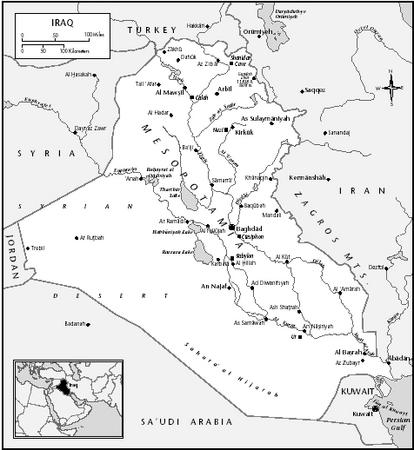
Iraq
fortress of Nebuchadnezzar, and the Greek amphitheater.
The Iraqi flag is also an important national symbol, and is composed of three colored, horizontal sections, starting with red on the top, white, and black. On the white band there are three green five-pointed stars. During the Persian Gulf War in 1991, the phrase Allahu Akbar (God is great) was added to the flag. The flag resembles other Arab countries' flags and demonstrates Iraqi faith in Allah and Arab unity.
History and Ethnic Relations
Emergence of the Nation. Starting from prehistory, the area of Mesopotamia has been under the
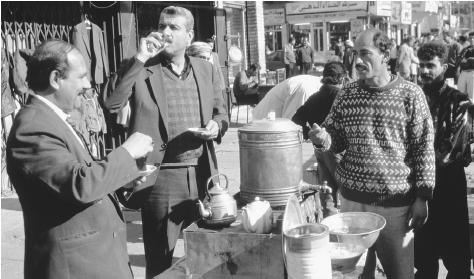
Iraqi men socialize at a tea stall in Baghdad.
control of several civilizations. In about 4000 B.C.E. the land belonged to the Sumerians, who built advanced irrigation systems, developed cereal agriculture, invented the earliest form of writing, a math system on which time in the modern world is based, the wheel, and the first plow. Literature was produced, including the first known recorded story, the Epic of Gilgamesh. Unlike their Egyptian counterparts who believed that all land belonged to the pharaoh, Sumerians believed in private property, still an important notion in Iraq today.
When the Sumerian civilization collapsed in about 1700 B.C.E. , King Hammurabi took over the area and renamed it Babylonia. Hammurabi, a great leader known for creating the first recorded legal code in history, united the Assyrians and Babylonians in harmony. Following several changes in power, Nebuchadnezzar II came to rule from 604 to 562 B.C.E. , and restored Babylonia to its former glory. Babylon, which is about thirty miles (forty-eight kilometers) south of modern-day Baghdad, became the most famous city in the world, and boasted, among other things, the Hanging Gardens of Babylon.
In 323 B.C.E. Babylonia became part of the Persian Empire, until Arab Muslims overtook it in 634 C.E. At the time of the invasion, the people of Mesopotamia were mostly Christian, and paid non-Muslim taxes to the invaders. As the Persians were eventually defeated, the people of Mesopotamia began to convert to Islam and intermarry with Arabs. In 762 C.E. the capital city of Baghdad was founded, and it became an important commercial, cultural, and educational center. It linked Asia to Mediterranean countries via trade; welcomed visitors, scholars, and commercial traders from all over the world; and produced incredible philosophical and scientific works by both Arab and Persian thinkers.
The 1200s witnessed yet another invasion, and control went to the Mongols, who ruled until the 1400s. The Ottoman Turks took control in the sixteenth century, in a reign that lasted until the end of World War I. When the Ottoman Empire was defeated in that war, the League of Nations assigned Britain to set up the administration in Mesopotamia. The British defined the territory of Iraq, and in doing so paid little attention to natural boundaries and ethnic divisions. They set up the institutional framework for government and politics, which included installation of a monarchy and influence in writing the constitution. On 14 July 1958 the monarchy was overthrown, and Iraq was declared a republic. The following ten years were followed by much political instability. Then, on 17 July 1968, another coup d'état occurred, which brought to power the Baath Party, today's government leader.
National Identity. Arab rule during the medieval period had the greatest cultural impact on modern Iraq. The dominating culture within Iraq is Arab, and most Arabs are Muslim. Iraqi Muslims are split into two groups, the Sunnis and the Shias (Shiites). The Sunnis, a majority in Islam, are a minority in Iraq, and the Shias, a minority in the Arab world, are the majority in Iraq. Between the Shia and Sunni Muslims, loyalty to Iraq has come to be a common factor. Though they have differing views, both Sunnis and Shias hold high leadership positions in the government (including the Sunni Saddam Hussein), as do some Christians.
The Arab culture, as influenced by the conquerors in the seventh century, withstood many changes of power throughout the centuries, and managed to remain influential. In the nineteenth century, while the Ottoman Empire was focusing on the "Turkification" of its people, rebels in Mesopotamia were building their Arab nationalist movement. They were granted an opportunity to act during World War I, when the British agreed to recognize Arab independence in Mesopotamia if they helped fight against the Turks. Though Iraq was subject to British mandate rule following the defeat of the Ottoman Empire, Arab nationalism stood strong. For the next few decades, even after independence from Britain, the government's attitude wavered between being pro-British and Arab nationalist. Today Iraq stands firm in its belief in pro-Arab nationalism.
Ethnic Relations. The largest minority in Iraq, the Kurds, continually battle with the majority Arabs, and the sparring between these two cultural groups has contributed to a survivalist mentality for the Kurds. The Turkomans, who populate the northern mountainous areas, also have had strained relations with the Kurds due to their historical role as buffers between Arab and Kurdish areas. Other cultural groups who are sometimes subject to the will of the Arab majority are the Yazidis, who are of Kurdish descent, but differ from the Kurds because of their unique religion. There are the Assyrians, who are direct descendents of the ancient Mesopotamian people and speak Aramaic. They are mainly Christian, and though they compose a significant minority in Iraq, the government does not officially recognize them as an ethnic group. Regarding relations with other countries, Iraq's Shias have been the traditional enemies of Persians for centuries; this contributed to Iraq fighting Iran in a costly war from 1980 to 1988 over a land dispute. The Iraqi Kurdish population is surrounded by fellow Kurds in the countries of Iran, Turkey, Syria, and Azerbaijan.
Urbanism, Architecture, and the Use of Space
Iraq's economy was once based on agriculture, which stipulated a large rural population. However, due to oil production, an economic boom hit Iraq in the 1970s, and with the change of economic basis, much of population migrated toward urban centers. Modern apartment and office buildings sprang up in Baghdad, and programs and services such as education and health care developed with the shift from rural areas to urban population centers. In addition to modernization, the influx of monetary resources allowed Iraq to do things for its cultural identity and preservation, especially in architecture. High priority was placed on restoring and building according to historic style, and the structures targeted included archaeological sites, mosques, and government buildings. Some of the traditional aspects of the architecture include rooms surrounding an open center or courtyard, and use of multiple colors, tiles, and arches.
Food and Economy
Food in Daily Life. Prior to the United Nations economic sanctions, the traditional diet included rice with soup or sauce, accompanied by lamb and vegetables. Today, because food is tightly rationed, most people eat rice or another grain sometimes with sauce. Both vegetables and meat are hard to come by. In rural areas it is customary for families to eat together out of a common bowl, while in urban areas individuals eat with plates and utensils.
Food Customs at Ceremonial Occasions. It is traditional to sacrifice a lamb or a goat to celebrate holidays. However, today few Iraqis have the means to do this, and celebrations are now minimal.
Basic Economy. Iraq's economy is currently in a difficult position. Following the 1991 Persian Gulf War, the United Nations imposed Security Council Resolution 687, which requires Iraq to disclose the full extent of its programs to develop chemical and nuclear weapons and missiles, and to eliminate its weapons of mass destruction. Until Iraq complies with these requirements, the United Nations attests that there will be an economic embargo and trade sanctions against Iraq. At first the resolution meant that Iraq could not assume trade relations with any foreign country. In 1996 the United Nations modified

The Dora Oil Refinery in Baghdad. The most important industries in Iraq produce crude oil, petroleum products, and natural gas.
the sanctions and implemented the oil-for-food program, which allows Iraq to pump and sell a limited amount of oil for humanitarian purposes, with no direct exchange of cash, but rather with all transactions taking place through an offshore escrow account. Two-thirds of the proceeds are to be spent on food and medicine for the Iraqi people; the remaining third is to be directed to victims of Iraq's occupation of Kuwait.
Prior to the sanctions, Iraq imported about 70 percent of its food. However, food shortages have forced people to grow their own, but given the severity of the economic situation of the country, it is difficult for Iraqis to find the means to do this. Items that are imported through the oil-for-food program are distributed to people in a food basket on the first of each month. The rations are estimated to last twenty to twenty-three days and include flour, tea, sugar, rice, beans, milk, cooking oil, soap, and salt.
Land Tenure and Property. Private property was an important notion first introduced by the Sumerians during their control of Mesopotamia, and emerged again in the late nineteenth century. The reintroduction of private property had a major impact on Iraq's social system, as it went from a feudal society where sheikhs provided both spiritual and tribal leadership for the inhabitants, to one separated between landowners and sharecroppers. At present many people have sold or are selling their land to the government to purchase essentials such as food and medicine. Though private property does exist, fewer and fewer people can now claim it.
Commercial Activities. Oil, mining, manufacturing, construction, and agriculture are the major types of goods and services produced for sale.
Major Industries. Crude oil, refined petroleum products, and natural gas are products produced by the most important industry in Iraq. Other products and services include light manufacturing, food processing, textiles, and mining of nonmetallic minerals.
Trade. Iraq may only legally trade with other countries through the oil-for-food program, wherein they are allowed to sell oil to buy basic food supplies. However, diplomatic reports have indicated that Iraq has been illegally exporting some of its medical supplies and food, purchased through the oil-for-food program, to Lebanon, Syria, and Jordan. Prior to the sanctions, Iraq's main exports were crude oil, refined petroleum products, natural gas, chemical fertilizers, and dates. Its major trade partners were Russia, France, Brazil, Spain, and Japan.
Division of Labor. It is common for jobs to be assigned through knowing people in the government. Those who enter the military may have more opportunity locating work, as they are trained for jobs that are specifically needed in the country.
Social Stratification
Classes and Castes. Arabs, Kurds, and other ethnic groups each have their own social stratospheres, and no one ethnicity dominates another in a caste system. In terms of social class there is great disparity between rich and poor. Those who compose the high class in society of Iraq are essentially chosen by the government, since there is no opportunity to start a business or make a name for oneself without the endorsement of the government. The once-dominant middle class of the 1970s has deteriorated in the face of the economic crisis. These people, who are very well educated, now perform unskilled labor, if they have jobs at all, and have joined the ranking of the majority lower or poor class.
Political Life
Government. Iraq is a republic divided into eighteen provinces, which are subdivided into districts. There is a National Assembly elected every four years, and they meet twice annually and work with the Revolutionary Command Council (RCC) to make legislative decisions. The RCC holds ultimate authority over legislative decisions, and the chairman of the RCC is also president of the country. The president exercises all executive decision-making powers, and he as well as the vice presidents are elected by a two-thirds majority vote of the RCC. There is universal suffrage at age eighteen, and the popular vote elects 220 of the 250 seats in the National Assembly. The president chooses the remaining 30 seats, which belong to the three provinces of Kurdistan; he also appoints judges.
Leadership and Political Officials. On 16 July 1979 Saddam Hussein became president of Iraq, and has been reelected since. He is also the prime minister, as well as chairman of the RCC. The Baath Party, which stands for Arab Socialist Resurrection, is the controlling party of the government and the most powerful political party. Its authority is the Regional Command, and the secretary general of the Regional Command is Saddam Hussein.
Political activities are carried out through the Progressive National Front (PNF), which is an official organization of political parties. PNF participants include the Iraqi Communist Party, Kurdish political parties, and other independent groups. Politics that try to be exercised outside the framework of the PNF are banned.
Though granted the right to vote for some positions, many Iraqis feel that elections are fixed. They also fear that they might vote for the "wrong" candidate and that they may be punished for doing so. It is a crime for any Iraqi to speak out against the government, and those who disagree with it place themselves and their families at great risk of being persecuted, as many citizens will turn in fellow Iraqis they feel are not loyal to the government or Saddam Hussein.
Social Problems and Control. The head of the formal judicial system is the Court of Cassation, which is the highest court in the country. There are other levels of courts, and all judges are government-appointed. Personal disputes are handled by religious community courts, which are based on Islamic law. Normally punishment is swift for crimes, with no long court trials and with severe sentences.
The crime rate has been traditionally low, but following the United Nations embargo, there has been an increase in crime, especially theft. In addition to crimes by the general public, many crimes by corrupt police and military forces have been reported, the most common being bribery and blackmail. Conditions in prisons are said to be extremely harsh. Prisoners are housed with more than twenty people in a cell meant for two, with no sanitation system, and no food is given unless brought by relatives. Other punishment practices include torture, often in front of family members, and execution.
Military Activity. Current statistics about Iraq's military are not available, though it is believed to be one of the strongest in the world. In 1994 a report indicated that Iraq spent $2.6 billion (U.S.) on its military. Iraq has not officially stated that military service is compulsory, but another statistic from 1994 stated that most of the 382,000 service people were required to be in the military. The average length of service was eighteen to twenty-four months, and there were another 650,000 in the reserves. Regarding compensation, wages for those who fought in the Iran-Iraq War were generous. Journalists reported that families who lost a son in the fighting would receive compensation in such
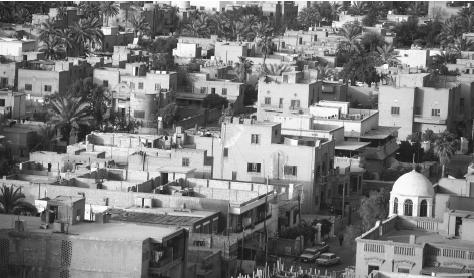
A residential district in Baghdad. After the economic boom of the 1970s, high priority was placed on restoring and building according to historic style.
forms as an automobile, a generous pension for life, real estate, and loans with easy terms for repayment. It is estimated that current compensation to the military has changed, but no specific information is available.
Social Welfare and Change Programs
Before the Persian Gulf War, welfare benefits such as Social Security, pensions for retirees and disabled people, and money for maternity and sick leaves were available. Currently the only known welfare programs are food distribution and medical aid food. Some nongovernmental organizations (NGOs) have been involved, but unless the Iraqi government can direct NGO operations, they are not permitted to function.
Nongovernmental Organizations and Other Associations
The most important NGOs are those that are responsible for food rationing and distribution, medical aid, and rebuilding of water and sewage treatment facilities. Many of the NGOs, such as the World Food Program, are associated with the United Nations. Currently Iraqi leaders have been turning down humanitarian efforts and have refused offers of relief from private medical groups. They recently expelled representatives of the Middle East Council of Churches, and denied entry of a Russian envoy from the United Nations who was to investigate the cases of missing persons since 1990. The only NGOs Iraq allows are foreign antisanctions protesters, who bring in small amounts of aid but who are welcome principally because of the propaganda they provide.
The presence of NGOs is different between the south and the three provinces of Kurdistan in the north. The Kurds welcomed NGOs in 1991, immediately following the Persian Gulf War, while they were not allowed in the South until 1996. Kurdistan hosts more than thirty NGOs, while in 1999 there were eleven in the south, with even fewer in 2000. Local Kurdish officials work with the United Nations to manage food, health, and economic programs, while the resources and control of the NGOs are restricted in the south. Due to the attitude toward NGOs as well as other contributing factors such as arable land, population, and availability of natural resources, the north is more productive agriculturally and economically and has a more advanced health system infrastructure. The south, under Iraqi control and closed to outside help, has
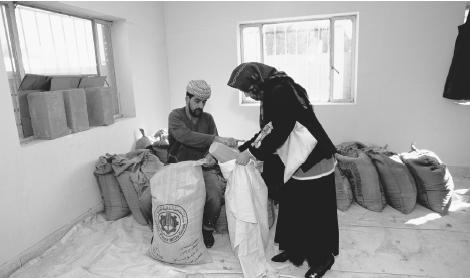
An Iraqi woman collects her monthly food rations from the Red Cross in Baghdad.
suffered with more food, health, and economic problems.
Gender Roles and Statuses
Division of Labor by Gender. During the Iran-Iraq War, with so many men fighting in the military, women were required to study in fields and to work in positions normally filled by men. Many women joined the labor force as teachers, physicians, dentists, factory workers, and civil servants, with the majority performing unskilled labor. Women professionals, such as doctors, are normally pediatricians or obstetricians, so that they work with only women or children. Those drafted into the workforce during the Iran-Iraq War were also made to comply with about a one-third deduction from their salary to go toward the war effort.
The Relative Status of Women and Men. The General Federation for Iraqi Women (GFIW) is a government organization for women with eighteen branches, one in each province. Its stated goal is to officially organize women, promote literacy and higher education, and encourage women in the labor force. The federation supported big legislative steps, such as a 1977 law that said a woman may be appointed an officer in the military if she has a university degree in medicine, dentistry, or pharmacy. However, it has had little impact on issues that affect women as individuals, such as polygamy, divorce, and inheritance.
Many believe that the GFIW is not really functioning in the interests of women, but rather in the interests of the Baathist regime. Instead of trying to improve the situation of women in Iraq, the government seems to use the federation as a means to exercise control over them. In an address to the federation, Saddam said that an educated and liberated mother is one who will give back to the country conscious and committed fighters for Iraq. An underlying goal of the GFIW, whether it is stated or not, is to encourage women to "liberate" themselves through commitment to the Iraqi revolution.
In politics Iraq was the first Arab country ever to elect a woman to a parliamentary position. Though an incredible advancement for women in the Arab world, many believe that rather than exercising real authority, she was put in power to falsely demonstrate the controlling regime as a progressive one. Today there are women in politics, though the legitimacy of their authority is often questioned. In Islam, the state religion, women do not hold any leadership roles. Many cannot go to the mosque to pray, and if they do, they are segregated from the men. It is largely due to Islamic influence that women do not enjoy the same social rights and privileges as men, and if gender reform is to take place, it will have to be within the context of Islamic law.
Marriage, Family, and Kinship
Marriage. In the past, arranged marriages were common. However, this practice is becoming more rare, and a law was passed that gave authority to a state-appointed judge to overrule the wishes of the father in the event of an early marriage. The Muslim majority traditionally views marriage as a contract between two families, as the family's needs are considered most important. In urban settings, women and men have more options in choosing their spouses, though the proposed spouse still must have parental approval. Partners often come from the same kin group, and though marriage between different ethnic groups is accepted, it is not too common. The ruling Baath regime considers marriage to be a national duty that should be guided and encouraged. Starting in 1982, women were forbidden to marry non-Iraqi men. If they were already married, they were prohibited from transferring money or property to their spouses.
Following the Iran-Iraq War, the loss of men's lives was so severe that the government embarked on a campaign to increase the population. Government grants were given to men to marry war widows, and polygamy, once rare, became more common. Divorce is accepted, but usually is left solely as a decision of the husband. If the husband wishes to be divorced, it is normally without question or problem, while it is close to impossible for a woman to initiate a divorce proceeding. In the event of divorce, custody is supposed to be granted based on what is best for the child's welfare.
Domestic Unit. Couples can live in either of two ways: with the husband's extended family, or as a nuclear family. At present, with economic hard-ships, families tend to live with extended households. The extended family unit consists of the older couple, sons, their wives and families, and unmarried daughters. Other dependent relatives also may make up part of this group, and the oldest male heads the group. He manages property and makes the final decisions regarding such things as the type of education the children receive, their occupations, and whom they will marry. In this living arrangement household and child-rearing tasks are shared among all female members of the larger families. If the couple can afford to live in a nuclear household, women, even though they work outside the home, retain all domestic and child-care responsibilities. The challenge of the woman's role in this situation is that there is no change in cooking methods or materials, and they are isolated from the help and emotional support of other female family members. Families often grow large, because the Iraqi government has stated that every family should have five children, as four children or fewer is considered a threat to national security. Considering the extreme hardships families now face in light of economic hardship and harsh living conditions, the goal of many is now to simply feed their families and preserve a semblance of some sort of home life.
Inheritance. Based on the Islamic rule, a man inherits twice as much as a woman. The justification for this is that women are to be protected by their male relatives, so men need to be granted more means to provide. Normally, property and belongings are passed down through the family, split two-to-one between sons and daughters.
Kin Groups. Large kin groups are the fundamental social units, and are of higher importance than ethnic, social class, and sectarian lines. Familial loyalty is considered an essential quality, and the family is mutually protective of each other. The kin group usually is organized through descent and marriage and involves three generations, many of whom live together. They often cooperate in areas such as agriculture and land ownership. If some family members live in nuclear families, they keep up practices such as depending on one another and asking the elders for advice. Individual status within the group is determined by the family's position and the individual's position within that group.
Socialization
Infant Care. Children are the mother's responsibility, and in extended domestic units other female members also take care of the children. Children normally imitate older siblings, and obedience and loyalty to elders are of vital importance. Boys and girls have different upbringings, as a boy's birth into the family is usually celebrated, while a girl's typically is not. The boy is thought to be more valuable to a family, given his potential to work, while the girl is considered more of a dependent. At puberty girls are separated from boys and have much less freedom than boys.
Child Rearing and Education. The family holds an important role in teaching values, and they consider it their duty and feel responsible for other family members' behaviors. A good child is loyal, obedient, and does not question authority. The
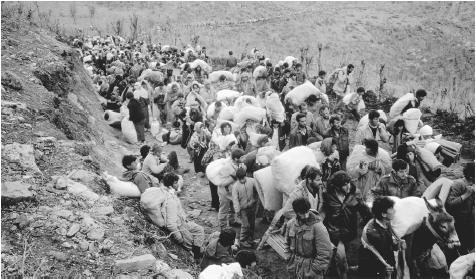
In March 1991, two million Kurds fled Iraq, settling at camps on the border to wait for humanitarian aid.
most important value impressed upon young girls and boys is premarital chastity. In addition, girls are taught ideas of weakness, naïveté, resignation, and passivity, while boys go with men at an early age to learn the worth of authority and dominance.
In urban settings, more authority is found in schools rather than with the family. Schools teach about religion and values that stem from it. One present problem, however, is that differing values are taught in schools than are taught in families. State schools tend to emphasize national sovereignty, Arab unity, economic security, and socialism, while families usually focus on such values as love, people, generosity, and religion. Many families also fear that their children acquire violent views and habits such as spying while in school.
Higher Education. Prior to the Persian Gulf War higher education was greatly prized, and the state used to pay for all of it, even literacy classes for adults. In the 1980s the literacy rate was about 80 percent, and there were several plans to build new universities and expand existing ones. During the Iran-Iraq War the government refused to recruit or draft university students, claiming that they would ensure the future of Iraq. However, the situation has gravely changed since the Persian Gulf War. No current literacy statistic is available, but in 1995 the rate was estimated to be 42 percent, a sharp drop from the previous decade. Also, there is no indication that the universities were ever expanded. Fewer women than men receive the highest levels of education.
Etiquette
In general, both adults and children keep to themselves and are not loud and boisterous, especially in public. Men commonly hold hands or kiss when greeting each other, but this is not the case for men and women. Respect is given to the elderly and women, especially those with children, as men give up their seats to them on buses and trains.
Religion
Religious Beliefs. Islam is the officially recognized religion of Iraq and is practiced by 95 percent of the population. Islam itself does not distinguish between church and state, so any distinctions between religious and secular law are the result of more recent developments. There are two forms of Muslims in Iraq, the majority Shias (Shiites) and the minority Sunnis. The Shias believe that the original twelve imams
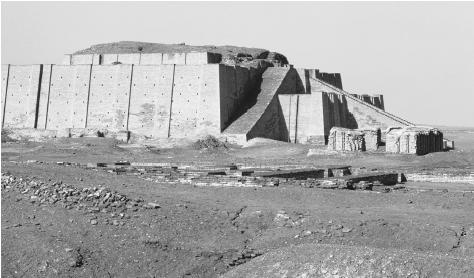
The ziggurat of Nanna, built around 2100 B . C . E . in the ancient city of Ur by Shulgi.
(Islamic leaders) were both spiritual and temporal leaders and that the caliph, or successor of Muhammad and leader of Islam, is selected through lineage and descent. The Sunnis believe that the imams were strictly temporal leaders and that the caliph should be elected. The Sunni sect is considered the orthodox branch of Islam. A small percentage of the population is Christian, divided into four churches: Chaldean, Nestorian, Jacobite (Syrian) Orthodox, and Syrian Catholic. The Yazidis, a cultural group living in the northern mountains, believe in a religion that combines paganism, Zoroastrianism, Christianity, and Islam. They are concentrated in the Sinjar Mountains in the north and are herders and cultivators. In the past they have been victims of persecution due to their religious beliefs and practices, of ten being called heretical.
Religious Practitioners. There are five pillars of Islam: praise of Allah as the only God, with Muhammad as his prophet; prayer five times per day; almsgiving; fasting; and pilgrimage to Mecca. Muezzins invoke a call to prayer, reminding everyone it is either time to pray or to call them to the mosque, and imams lead the prayers. Imams are not required to go through formal training, but usually are men of importance in their communities and are appointed by the government. During Ramadan, men gather in homes or the marketplace to participate in readings of the Qur'an led by mumins (men trained at a religious school in An Najaf) or by mullahs (men apprenticed with older specialists). Christians are organized under a bishop who resides in Baghdad, and gather for Mass on Sundays.
Rituals and Holy Places. Muslims gather at the mosque every Friday for afternoon prayer. Ramadan falls in the ninth month of the Muslim calendar, which is on a lunar cycle and thus falls during different times of the year. The month entails a period of fasting from all food, drink, and activities such as smoking and sexual intercourse during daylight hours. At night the fast is broken, and on the first day of the tenth month there is a celebration, Id al Fitr, to acknowledge the end of the fast. During Id al Adha, on the tenth day of the twelfth month, there is a sacrificial festival. Both this and the one following Ramadan last for three or four days, and people dress up, visit each other, exchange gifts, and also visit cemeteries.
Death and the Afterlife. Funerals are very simple and somber events. People are buried on the day following their death, and are wrapped in a white cloth and placed in a plain box, if available. Whether the person is rich or poor, funerals are generally the same for everyone.
Medicine and Health Care
Health care is socialized, with a few private hospitals. The current situation of hospitals is dire, as they are tremendously understaffed, under-equipped, and overbooked. There has been a dramatic rise in disease since 1990, due to chemicals used in the fighting of the Persian Gulf War, and from malnutrition and bacterial disease exacerbated by conditions resulting from the economic embargo. In the 1980s Iraq was extremely advanced in health care, but lack of resources and education has compromised medical advancement, and in fact has caused it to regress. Doctors who could once cure many diseases through medicine or surgery are no longer able to do so due for lack of resources. Because Iraq was so advanced in medical expertise in the past, there was little reliance on traditional medicine. The current situation is disheartening for older physicians, because they are not able to do medical procedures that they have the capability to perform, and young physicians are no longer educated in the available techniques that older physicians know. The health care situation is rapidly deteriorating, and once-controlled diseases such as malnutrition, diarrhea, typhoid fever, measles, chicken pox, and cholera are reappearing in great numbers; in addition, there is a large increase in diseases such as leukemia and other cancers.
Secular Celebrations
The Anniversary of the Revolution is 17 July and the most important secular holiday. It was on this day in 1968 that the Baath Party took control of the Republic of Iraq. Other holidays celebrate Islamic feasts and include the day following the month-long fast of Ramadan (Id al Fitr), the sacrificial festival of Id al Adha, the birth of Muhammad, and a pilgrim's return from Mecca.
The Arts and Humanities
Support for the Arts. The government supports artists, provided they are chosen by the state and do works requested by the state. For example, all writers, when commissioned by the state, must include praise to Saddam Hussein in their work. In general, artistic forms of thought and expression have been banned. Private ownership of typewriters and photocopiers is prohibited, so that no independent writings may be published or distributed. In addition, publishing houses, distribution networks, newspapers, art galleries, theaters, and film companies are subject to state censorship and must register all writing equipment with authorities. The end result is that artists are unable to express themselves freely.
Graphic Arts. Islamic art is very important, as are ceramics, carpets, and Islamic-style fashion design. In 1970 the Iraqi Fashion House opened, and design concentrated on the preservation of traditional attire and historical style. At present historical art, which is colorful and fine, has been reduced to art produced for function, such as sculptures of political figures and propaganda for the government.
Performance Arts. Music festivals have been important, such as the Babylon International Music and Arts Festival (last held in 1987 and 1995). International orchestras and performance troupes were invited to perform in the restored sites of Babylon, and people from all over the world attended. At present due to the harsh and severe living conditions, there are no resources to allocate to performance arts.
Bibliography
Al-Khalil, Samir. Republic of Fear: The Politics of Modern Iraq , 1991.
Al-Khayyat, Sana. Honor and Shame: Women in Modern Iraq , 1990.
Baram, Amatzia. Culture, History, and Ideology in the Formation of Ba'thist Iraq, 1968–89 , 1991.
Calabrese, John, ed. The Future of Iraq , 1997.
CARDRI (Committee Against Repression and for Democratic Rights in Iraq). Saddam's Iraq: Revolution or Reaction? , 1986.
Chalian, Gerard, ed. A People Without a Country: The Kurds and Kurdistan , 1993.
Crossette, Barbara. "Iraq Won't Let Outside Experts Assess Sanctions' Impact." New York Times , 12 September 2000.
Fernea, Elizabeth and Robert. The Arab World: Personal Encounters , 1985.
Fisher, W. B. The Middle East and North Africa 1995 , 1994.
Hazelton, Fran, ed. Iraq Since the Gulf War: Prospects for Democracy , 1994.
Hopwood, Derek; Ishow, Habib; and Kozinowski, Thomas, eds. Iraq: Power and Society , 1993.
Lewis, Bernard. The Middle East: A Brief History of the Last 2000 Years , 1995.
Lukitz, Liora. Iraq: The Search for National Identity , 1995.
Marr, Phebe. The Modern History of Iraq , 1985.
Miller, Judith and Laurie Mylroie. Saddam Hussein and the Crisis in the Gulf , 1990.
Roberts, Paul William. The Demonic Comedy: Some Detours in the Baghdad of Saddam Hussein , 1998.
Simons, G.L. Iraq: From Sumer to Saddam , 1994.
Taylor, Marisa. "The Great Iraqi Exodus: Arrival of Chaldeans at Border Part of 'Enormous' Migration." San Diego Union Tribune , 30 September 2000.
